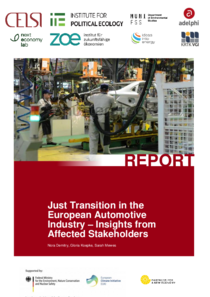Just transition in the European automotive industry: insights from affected stakeholders

Demitry, Nora ; Koepke, Gloria ; Mewes, Sarah
Adelphi & NELA - Bonn
2022
49 p.
automobile industry ; sustainable development ; decarbonization ; industrial policy ; labour market policy ; social protection
Industrial economics
English
Bibliogr.
"Today transport contributes to about 20% of Europe's CO2 emissions – the lion's share is caused by automobile transport. To achieve the climate goals of the Paris Agreement, a transformation of the automotive industry is therefore inevitable. The automotive industry accounts for almost 14 million direct and indirect jobs along the value chain throughout the whole EU and is a key economic sector in Central and Eastern Europe (CEE). These jobs will be affected by an encompassing technological and structural transition of the mobility sector that is needed to reach climate neutrality. Based on empirical evidence and 14 expert interviews, this report provides an overview of the status quo in the sector on a European level with regards to a Just Transition and proposes policies to make it just and sustainable.
Currently, the European transformation of the automotive industry is advanced by the CO2-emission-regulation, which aims toward the establishment of a zero-emission transport system in the future. Until today, no special attention has been paid to the implications of this transition for workers in the automotive industry. Nevertheless, its transformation is already in full swing: New driving technologies are emerging, paving the way towards the full electrification of cars. A phase-out of the internal combustion engine (ICE) in the nearby future seems to be imaginable. Despite these rushed and promising developments, it needs to be highlighted that they do not erase all the climate and environmental issues at stake. Electric cars also pose ecological challenges, like the use of raw minerals during battery production, which makes the production site even more emission-intensive than ICE cars. Regarding this challenge, a mere replacement of ICEs by battery-electric vehicles (BEV) becomes questionable, at least, as a successful way towards zero-emission transport. It looks as if a sustainable solution requires more fundamental changes in transport as well as a total reduction of the European car fleet. The ongoing modal shift of transport is already pointing in that direction. Through connected and digital solutions, other more ecological modes of transport are becoming more attractive. Digitalisation has the power to revolutionise the car-ownership and usage model in favour of shared solutions, possibly leading to a shrinking of the overall number of cars. In the future, the automotive industry will not only be electrified. It will also be digitalised and maybe even incorporate the fabrication of other transport products. ..."
Digital
The ETUI is co-funded by the European Union. Views and opinions expressed are however those of the author(s) only and do not necessarily reflect those of the European Union or the ETUI.